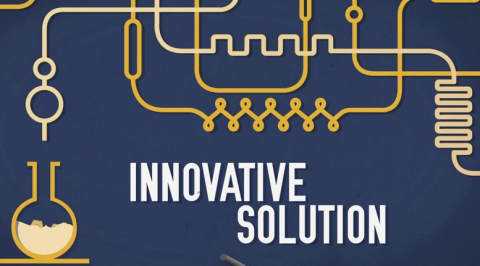
Cyclotron-Based Tc-99m Production Method Reveals A Scalable, On-Site Solution
A Canadian team confirms an effective solution for the looming national threat of a shortage of technetium-99m (Tc-99m) – a life-saving diagnostic isotope used in cardiac tests and cancer scans. The team demonstrated a process that enables the routine production of sufficient Tc-99m to satisfy the daily demand for a population the size of British Columbia – or 500 patients scans – from a six-hour run on a common brand of medical cyclotrons.
The team’s breakthrough demonstrates the workability of decentralized, non-reactor based production of Tc-99m that eliminates the threat of an isotope shortage. The solution enables Canada to shift away from reactor-based production of Mo-99, the parent isotope currently required for generation of Tc-99m, while providing a safe and secure supply chain for Canadian patients.
“The announcement of today's latest breakthrough in non-reactor based medical isotope production is outstanding news,” said the Honourable Greg Rickford, Minister of Natural Resources. “We congratulate this Canadian team of scientists from TRIUMF and its partners on this impressive milestone. Our Government's investment in scientific research is supporting the future production of a reliable, daily supply of life-saving medical isotopes for a population the size of British Columbia.”
This achievement is a direct result of investment provided by the Government of Canada through programs at the Natural Sciences and Engineering Research Council, the Canadian Institutes of Health Research, and Natural Resources Canada.
“Investments from the Canadian government, including Natural Resources Canada’s Isotope Technology Acceleration Program, have positioned Canada to develop solutions to the medical isotope crisis,” said Dr. Jonathan Bagger, TRIUMF Director. “Because of its technical expertise and its existing cyclotron infrastructure, Canada will meet its future Tc-99m needs.”
The interdisciplinary team, comprised of members from TRIUMF, the BC Cancer Agency, the Centre for Probe Development & Commercialization, the Lawson Health Research Institute, and the University of British Columbia, has developed a production method for Tc-99m that can be used by the various brands of conventional cyclotrons already in use by hospitals and health centres across the country. This allows for rapid deployment of the novel technology with scalability to achieve regional demands.
The current success of producing 34 Curies over a six hour run was attained on a TR-series cyclotron at TRIUMF in Vancouver. The TR cyclotrons are manufactured by Advanced Cyclotron Systems, Inc. of Richmond, BC. Today’s achievement followed similar record-setting productions on a TR19 cyclotron located at the BC Cancer Agency and on a General Electric PETtrace880 cyclotron located at the Lawson Health Research Institute in London, Ontario. The GE and TR cyclotrons account for 70 percent of the cyclotron infrastructure in place across Canada.
Next steps towards implementing this technology include performing clinical trials in early 2015, obtaining authorization from Health Canada, and partnering with provincial health authorities. Advanced Applied Physics Solutions Inc. – a TRIUMF-affiliated company – is licensing the technology for the global market.
“As discussions with Health Canada continue, we are en route to full market approval for cyclotron produced Tc-99m in Canada,” said Dr. Paul Schaffer, TRIUMF’s Head of Nuclear Medicine. “We've proven the viability of Tc-99m production on various brands of cyclotrons so Canada has options. We're ready implement the solutions.”
–Taken from a TRIUMF news release
Related news items:
- "Une solution viable à la pénurie d'isotopes médicaux" ICI Radio Canada (January 5, 2015)
- Audio interview: "Découverte médicale importante à Vancouver" ICI Radio Canada (January 5, 2015)
- "Solution for medical isotope shortage" Digital Journal (January 6, 2015)
- "Vancouver scientists solve isotope shortage" 24hrs Vancouver (January 8, 2015)
- "Nouvelle manière de produire les isotopes médicaux" TVA Nouvelles (January 8, 2015)
- "B.C. Researchers produce medical isotopes without reactor" Metro News Vancouver (January 8, 2015)
- "Cyclotron shown as reliable source of medical isotopes" Lab Product News (January 8, 2015)
- "Scientists develop new way to make medical isotopes" Sun News Media (January 8, 2015)
- "UBC scientists help avert a nuclear medicine meltdown" UBC Media, phys.org, Health Canal (January 8, 2015)
- "BC researchers say they've solved Canada's looming medical isotope shortage" The Province (January 8, 2015)
- "Breakthrough UBC research finds cleaner, safer source of medical isotopes than nuclear power plants" Leaderpost (January 8, 2015)
- "Producing Medical Isotopes in Back Lot" iPolitics (January 9, 2015)
- "New way to make isotopes" Toronto Sun (January 9, 2015)
- "Medical isotope breakthrough is a B.C. TRIUMF" Business in Vancouver and print (January 16, 2015)
- "Canadian group reaches milestone on Tc-99m project" AuntMinnie (January 19, 2015)
Technetium-99 and the Global Shortfall from TRIUMFLab on Vimeo.
